Pregnancy Diet
Medically reviewed by Drugs.com. Last updated on Aug 4, 2025.
What is a healthy diet during pregnancy?
A healthy diet during pregnancy is a meal plan that provides the amount of calories and nutrients you need during pregnancy. Your body needs extra calories and nutrients to support your growing baby. You need to gain the right amount of weight for a healthy baby and pregnancy. Babies born at a healthy weight have a lower risk of certain health problems at birth and later in life. A healthy diet may help you avoid gaining too much weight. Too much weight gain may cause problems for you during your pregnancy and delivery.
What should I avoid or limit while I am pregnant?
- Do not drink alcohol during pregnancy. Alcohol can increase your risk of a miscarriage (losing your baby). Your baby may also be born too small and have other health problems, such as learning problems later in life.
- Do not eat raw or undercooked foods. Examples include meat, poultry, eggs, fish, and shellfish (shrimp, crab, lobster). Cook leftover foods and ready-to-eat foods such as hot dogs until they are steaming hot.
- Do not have anything that is not pasteurized. Pasteurization is a heating process that destroys bacteria. Do not have milk, juice, or cheese that has not been pasteurized. Cheeses include Brie, feta, Camembert, blue, and Mexican cheeses.
- Limit caffeine to avoid possible health problems. It is not clear how caffeine affects pregnancy. Your dietitian can tell you how much caffeine is okay for you to have in a day or week. Caffeine may be found in coffee, tea, cola, sports drinks, and chocolate.
- Limit foods that contain mercury. Mercury is naturally found in almost all types of fish and shellfish. Some types of fish absorb higher levels of mercury that can be harmful to an unborn baby. Eat only fish and shellfish that are low in mercury. Each week, you may eat up to 12 ounces of fish or shellfish that have low levels of mercury. These include shrimp, canned light tuna, salmon, pollock, and catfish. Eat only 6 ounces of albacore (white) tuna per week. Albacore tuna has more mercury than canned tuna. Do not eat shark, swordfish, king mackerel, or tilefish.
Which foods can I eat while I am pregnant?
Eat a variety of foods from each of the food groups listed below. Eat healthy foods even if you take a prenatal vitamin every day. Your dietitian will tell you how many servings you should have from each food group each day to get enough calories. The amount of calories you need depends on your daily activity, your weight before pregnancy, and current weight gain. In the first trimester, you usually do not need extra calories. In the second and third trimesters, most women should eat about 300 extra calories each day.
- Fruits and vegetables: Half of your plate should contain fruits and vegetables.
- Fruits: Choose fresh, canned, or dried fruit as often as possible.
- 1 cup of sliced, diced, cooked, or canned fruit (canned in light syrup or 100% juice)
- 1 large peach, orange, or banana
- ½ cup of dried fruit
- 1 cup of fruit juice
- Vegetables: Eat more dark green, red, and orange vegetables. Dark green vegetables include broccoli, spinach, romaine lettuce, and collard greens. Examples of orange and red vegetables are carrots, sweet potatoes, winter squash, oranges, and red peppers.
- 1 cup of cooked or raw vegetables
- 1 cup of vegetable juice
- 2 cups of raw leafy greens
- Fruits: Choose fresh, canned, or dried fruit as often as possible.
- Grains: Half of the grains you eat each day should be whole grains.
- Whole grains:
- ½ cup of cooked brown rice or cooked oatmeal
- 1 cup (1 ounce) of whole-grain dry cereal
- 1 slice of 100% whole-wheat or rye bread
- 3 cups of popped popcorn
- Other grains:
- ½ cup of cooked white rice or pasta
- ½ of an English muffin
- 1 small flour or corn tortilla
- 1 mini-bagel
- Whole grains:
- Dairy foods: Choose fat-free or low-fat pasteurized dairy foods:
- 1½ ounces of hard cheese (mozzarella, Swiss, cheddar)
- 1 cup (8 ounces) of low-fat or fat-free milk or yogurt
- 1 cup of low-fat frozen yogurt or pudding
- Meat and other protein sources: Choose lean meats and poultry. Bake, broil, and grill meat instead of frying it. Include a variety of mercury-free seafood in place of some meat and poultry each week. Eat a variety of protein foods:
- ½ ounce of nuts (12 almonds, 24 pistachios, 7 walnut halves) or 1 tablespoon of peanut butter (1 ounce)
- ¼ cup of soy tofu or tempeh (1 ounce)
- 1 egg
- ¼ cup of cooked dried beans, peas, or lentils (1 ounce)
- 1 small chicken breast or 1 small trout (about 3 ounces)
- 1 salmon steak (4 to 6 ounces)
- 1 small lean hamburger (2 to 3 ounces)
- Fats: Limit saturated fats, trans fats, and cholesterol. These unhealthy fats are found in shortening, butter, stick margarine, and animal fat. Choose healthy fats such as polyunsaturated and monounsaturated fats:
- 1 tablespoon of canola, olive, corn, sunflower, or soybean oil
- 1 tablespoon of soft margarine
- 1 teaspoon of mayonnaise
- 2 tablespoons of salad dressing
- ½ of an avocado
 |
What do I need to know about vitamin and mineral supplements?
Your healthcare provider will tell you if you need a supplement and the type you should take. Talk to your provider before you take any other kind of supplement, including herbal (natural) supplements. The following are general guidelines:
- Folic acid is one of the most important vitamins during pregnancy. Your prenatal vitamins will also contain folic acid. Make sure you take your prenatal vitamin every day. If you forget to take your vitamin, do not take double the amount the next day. You need at least 400 mcg of folic acid each day before you get pregnant. Folic acid helps to form your baby's brain and spinal cord in early pregnancy. During pregnancy, your daily need for folic acid increases to about 600 mcg. Get folic acid each day by eating citrus fruits and juices, green leafy vegetables, liver, or dried beans. Folic acid is also added to foods such as breakfast cereals, bread products, flour, and pasta.
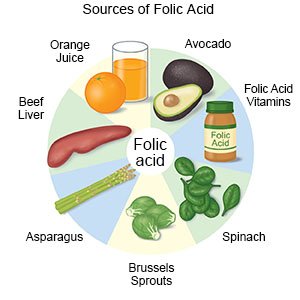
- You need about 30 mg of iron each day during pregnancy. Iron is a mineral the body needs to make hemoglobin, which is a part of red blood cells. Hemoglobin helps your blood carry oxygen from the lungs to the rest of your body. Foods that are good sources of iron are meat, poultry, fish, beans, spinach, and fortified cereals and breads. Your body will absorb iron better from non-meat sources if you have a source of vitamin C at the same time. Drink tea and coffee separately from iron-fortified foods and iron supplements.
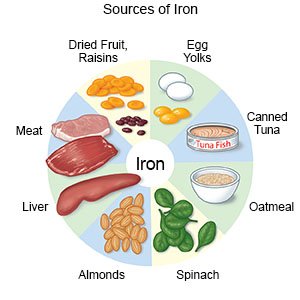
- Calcium and vitamin D needs go up during pregnancy. Women who do not eat dairy products may need a calcium and vitamin D supplement. Talk to your dietitian about calcium supplements if you do not regularly eat good sources of calcium. The amount of calcium you need is about 1,300 mg if you are between 14 and 18 years old and 1,000 mg if you are 19 to 50 years old. If you cannot drink milk or eat dairy foods, try lactose-free or lactose-reduced milk or calcium-fortified soy milk. Ask your dietitian about pills you can take to help you digest milk products. Eat other drinks and foods that are fortified with calcium, such as orange juice.
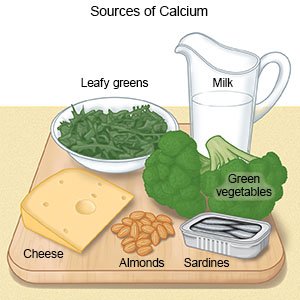
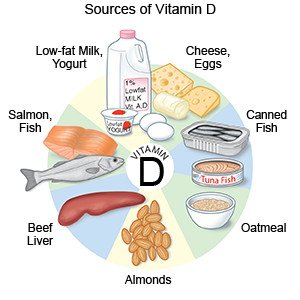
What diet changes may help morning sickness?
Morning sickness is common during the first few months of pregnancy. You may feel nauseated, and you may vomit several times each day. To improve symptoms of morning sickness, eat small meals often instead of 3 large meals. Foods high in carbohydrate, such as crackers, dry toast, and pasta, may be easier for you to eat. Drink liquids between meals rather than with meals.
What diet changes may help constipation?
A high-fiber diet can improve the symptoms of constipation. Whole-grain breakfast cereals, whole-grain breads, and prune juice are high in fiber. Raw fruits and vegetables, and cooked beans are also good sources of fiber. It may also be helpful to increase your intake of fluids and get regular physical activity. Talk with your healthcare provider before you begin any exercise program.
 |
What diet changes may help heartburn?
To improve the symptoms of heartburn, do not lie down right after you eat. When you do lie down, sleep with your head slightly elevated. Eat small, frequent meals instead of 3 large meals. It may also be helpful to avoid caffeine, chocolate, and spicy foods.
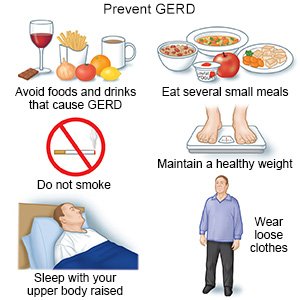 |
What other healthy guidelines should I follow?
- Make sure you get enough protein, vitamin B12, and iron if you are a vegetarian or vegan. Some non-meat sources of these nutrients are fortified cereals, nut butters, soy products (tofu and soymilk), nuts, grains, and legumes. These nutrients are also found in eggs and milk products.
- Talk to your dietitian about how to manage cravings for certain foods. Foods that are high in calories, fat, and sugar should not replace healthy food choices. Some women have cravings for unusual substances such as clay, dirt, laundry starch, ice, and chalk. This condition is called pica. These may lead to health problems such as anemia and cause other health problems.
When should I call my dietitian or obstetrician?
- You are losing weight without trying.
- You have cravings for substances such as clay, dirt, laundry starch, or ice.
- You have questions or concerns about your condition or care.
Care Agreement
You have the right to help plan your care. Discuss treatment options with your healthcare provider to decide what care you want to receive. You always have the right to refuse treatment. The above information is an educational aid only. It is not intended as medical advice for individual conditions or treatments. Talk to your doctor, nurse or pharmacist before following any medical regimen to see if it is safe and effective for you.© Copyright Merative 2025 Information is for End User's use only and may not be sold, redistributed or otherwise used for commercial purposes.
Further information
Always consult your healthcare provider to ensure the information displayed on this page applies to your personal circumstances.
